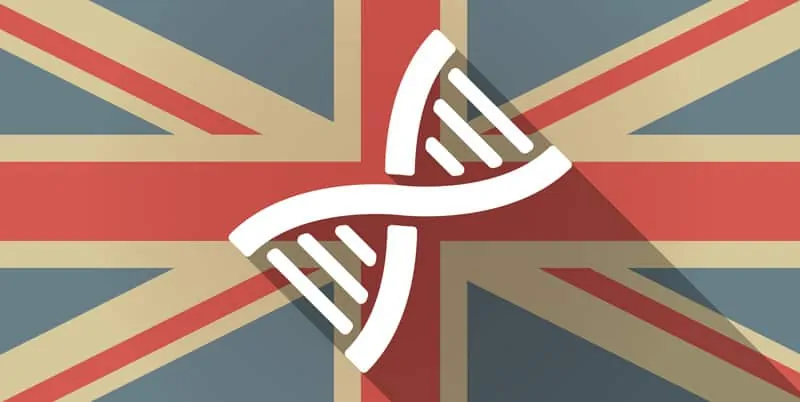It’s easy to have genealogical DNA testing done these days, but it isn’t always easy to understand the results. Many people feel surprised when they see their ethnicity results and wonder whether the test messed up. Odds are, the test was fine. It’s how the results are interpreted that makes the difference.
Many Americans have ancestors from the British Isles, but their tests don’t always show that or show it in a way they don’t expect. What does Great Britain DNA mean in your DNA test results? It means that sometime in the last few hundred years, you had ancestors from Great Britain. But you also have to consider whose test you took which I talk about below.
Same test, different results
There are several companies that offer genealogical DNA testing. When it comes to measuring ethnicity, they all use the same test: an autosomal DNA test. But they don’t all divide up the world the same way.
- FamilyTreeDNA uses a single “British Isles” category to cover everyone in that region
- 23andMe uses “British and Irish” to cover the same area
- MyHeritage DNA has one region for “English” and another for “Irish, Scottish, and Welsh”
- AncestryDNA’s list of regions has exploded recently, and they now have Wales (5 regions), Scotland (21 regions), England and Northwestern Europe (41 regions), and Ireland (94 regions)
While that makes Ancestry DNA look like an obvious winner for tracking ancestors, that may not be true. Broader categories make it easier to match what you have already found and avoid the danger of missing ancestors because you’re looking in the wrong place.
Where do ethnicity estimates come from?
People used to move around a lot less in the past. Because they lived in one spot for generations and had kids with other people living in the same spot, some genes became dominant in that place. That’s why, for example, redheads are more common in Ireland and Scotland than anywhere else in the world.
By comparing how closely your DNA matches other people from certain regions, the test can estimate where your ancestors came from. It isn’t exact – people did move around and intermarried – but it is getting more accurate all the time.
England got invaded (a lot)
You might think that a couple of islands on the corner of Europe would be isolated, but that isn’t the case. People have been invading it for thousands of years and leaving their ancestors behind. Romans, Vikings, Anglo-Saxons, Normans, and more have all left their genetic mark on the British Isles.
That means that, even though your ancestors have lived in Britain for many generations, some of their genes could have come from farther away, including:
- Western, Eastern, and Southern Europe
- Scandinavia
- Finland
- Russia and the Caucasus
- Iberian Peninsula
Even if you were born in Britain yourself, your ethnicity will still, on average only show 60% British Isles.
Who came when?
The first significant influx of foreigners were the Romans, who spent close to 400 years in Britain. They mainly remained in the south and founded several cities, including Londinium (which later became London). They fought their way into Scotland and Wales at times, too, but not Ireland. Their descendants may have Southern Europe show up in their ethnicity results.
The Vikings raided many times over a period of 300 years, from the late 700s to the mid-1000s. Many of these were quick strikes, but just as many resulted in longer expeditions and even permanent settlements. In fact, the Norse were so well established in the Hebrides islands off the west coast that they did not become part of Scotland until 1266. Their descendants carry genes that show up as Scandinavian DNA.
William the Conqueror invaded in 1066, bringing thousands of Normans from France. They not only introduced their language and culture, but their DNA as well. While relations between Britain and France haven’t always been friendly over the years, there have still been plenty of times of peace, resulting in even more immigration over the centuries. That includes about 50,000 Huguenots who arrived in the 16th century to avoid religious persecution. If your ethnicity shows French or Northwestern European, chances are you have some Norman ancestors.
The UK has one of the largest Jewish populations in the world. They probably started arriving around the 11th century, and many more have arrived over the 1000 years since then. The Roma people of Eastern Europe have been coming to the British Isles for at least 500 years, too. It should come as no surprise if your British Isles ancestors have some Jewish or Eastern European genes.
India came under British rule in 1612, which resulted in many British people moving to India and a lot of Indians moving to the British Isles. Given the number of other countries that were subjects of the British Empire, finding an Indian or Southeast Asian component on your ethnicity report is entirely possible.
And those are just the major groups that arrived. People from all over the world have come to Britain over the years, and brought their genes with them.
Migration works both ways
But what if your ancestors came from Scandinavia, or France, or Germany? You might not have realized you had any English, Scottish, Irish, or Welsh ancestors at all until you received your ethnicity report. But just as people from many other countries came to the British Isles, many people left the British Isles for other parts of the world.
Before the 17th century, British travelers and emigrants were most likely to be found in Northern and Central Europe, Southern Europe, and Scandinavia. But with the expansion of the British Empire into Africa, Asia, and America, they can be found everywhere in the world. Even if you don’t have any obvious link to Britain, it is entirely possible you have British genes, and you may have to dig further to find out where they came from.
A thousand years is long enough
If your ethnicity doesn’t include as much British Isles as you expected, chances are your ancestors came from further abroad. But that doesn’t mean they came recently. Keep in mind that many of those invaders and immigrants came more than a thousand years ago. At some point, we have to consider them British. If your ancestors lived in the British Isles for a thousand years, or even a few hundred, there’s certainly no reason not to consider them British.
Keep in mind that the average person born in the British Isles today, and who we would certainly call British, has over a third of their DNA coming from non-British sources.
To be British, or not to be British
What it comes down to is this: don’t let your ethnicity report make you mistrust your research. If you have done your work and used evidence to trace your ancestors to the British Isles, that is far more dependable than an ethnicity report.
At the same time, that doesn’t make your ethnicity report worthless. If you haven’t been able to find your British ancestors, discovering genes from other parts of the world can be incredibly helpful in uncovering new places to look for more clues.



